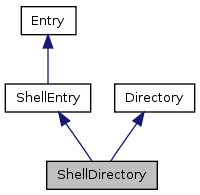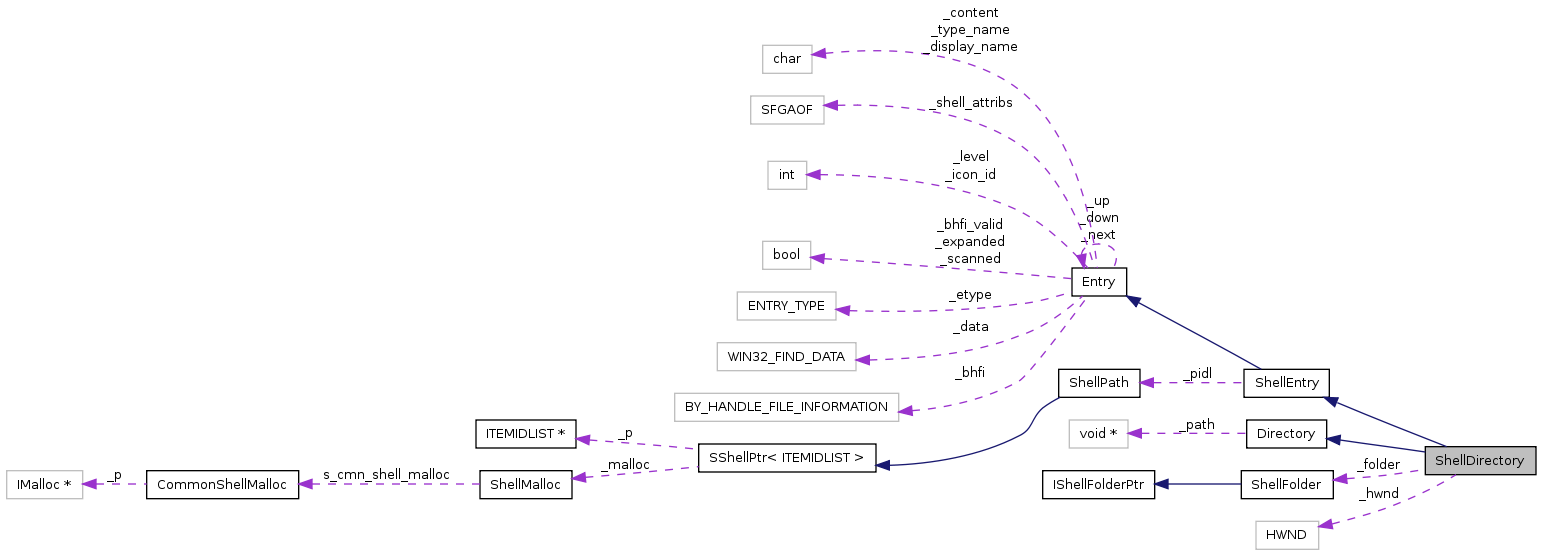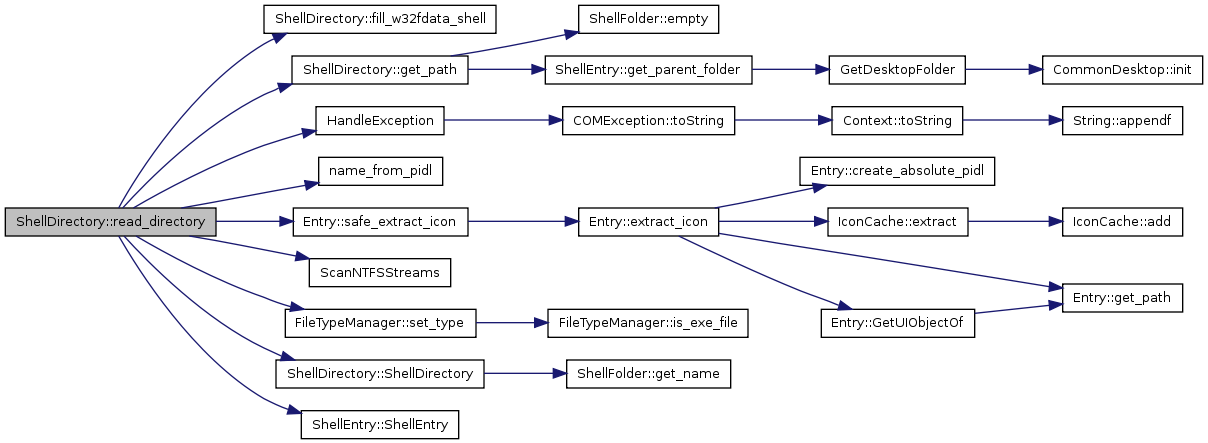shell folder entry More...
#include <shellfs.h>


Public Member Functions | |
| ShellDirectory (ShellFolder &root_folder, const ShellPath &shell_path, HWND hwnd) | |
| ShellDirectory (ShellDirectory *parent, LPITEMIDLIST shell_path, HWND hwnd) | |
| ShellDirectory (const ShellDirectory &other) | |
| ~ShellDirectory () | |
| virtual void | read_directory (int scan_flags=0) |
| virtual const void * | get_next_path_component (const void *) const |
| virtual Entry * | find_entry (const void *) |
| virtual bool | get_path (PTSTR path, size_t path_count) const |
| virtual ShellFolder | get_shell_folder () const |
| int | extract_icons (ICONCACHE_FLAGS flags) |
Public Attributes | |
| ShellFolder | _folder |
| HWND | _hwnd |
Protected Member Functions | |
| bool | fill_w32fdata_shell (LPCITEMIDLIST pidl, SFGAOF attribs, WIN32_FIND_DATA *, BY_HANDLE_FILE_INFORMATION *, bool do_access=true) |
Detailed Description
shell folder entry
Definition at line 53 of file shellfs.h.
Constructor & Destructor Documentation
| ShellDirectory::ShellDirectory | ( | ShellFolder & | root_folder, |
| const ShellPath & | shell_path, | ||
| HWND | hwnd | ||
| ) | [inline] |
Definition at line 55 of file shellfs.h.
References Entry::_data, Directory::_path, Entry::_shell_attribs, CONTEXT, and ShellFolder::get_name().
Referenced by read_directory().
: ShellEntry(shell_path), _folder(root_folder, shell_path), _hwnd(hwnd) { CONTEXT("ShellDirectory::ShellDirectory()"); lstrcpy(_data.cFileName, root_folder.get_name(shell_path, SHGDN_FORADDRESSBAR)); _data.dwFileAttributes = FILE_ATTRIBUTE_DIRECTORY; _shell_attribs = SFGAO_FOLDER; ShellFolder subfolder(root_folder, shell_path); IShellFolder* pFolder = subfolder; pFolder->AddRef(); _path = pFolder; }


| ShellDirectory::ShellDirectory | ( | ShellDirectory * | parent, |
| LPITEMIDLIST | shell_path, | ||
| HWND | hwnd | ||
| ) | [inline, explicit] |
Definition at line 72 of file shellfs.h.
References _folder, and Directory::_path.
: ShellEntry(parent, shell_path), _folder(parent->_folder, shell_path), _hwnd(hwnd) { /* not neccessary - the caller will fill the info lstrcpy(_data.cFileName, _folder.get_name(shell_path)); _data.dwFileAttributes = FILE_ATTRIBUTE_DIRECTORY; _shell_attribs = SFGAO_FOLDER; */ _folder->AddRef(); _path = _folder; }
| ShellDirectory::ShellDirectory | ( | const ShellDirectory & | other ) | [inline] |
Definition at line 86 of file shellfs.h.
References Directory::_path.
| ShellDirectory::~ShellDirectory | ( | ) | [inline] |
Definition at line 96 of file shellfs.h.
References Directory::_path.
Member Function Documentation
| int ShellDirectory::extract_icons | ( | ICONCACHE_FLAGS | flags ) |
Definition at line 525 of file shellfs.cpp.
References Entry::_down, Entry::_next, ICID_NONE, and ICID_UNKNOWN.
Referenced by StartMenu::UpdateIcons().
{
int cnt = 0;
for(Entry*entry=_down; entry; entry=entry->_next)
if (entry->_icon_id == ICID_UNKNOWN) {
entry->_icon_id = entry->extract_icon(flags);
if (entry->_icon_id != ICID_NONE)
++cnt;
}
return cnt;
}

| bool ShellDirectory::fill_w32fdata_shell | ( | LPCITEMIDLIST | pidl, |
| SFGAOF | attribs, | ||
| WIN32_FIND_DATA * | pw32fdata, | ||
| BY_HANDLE_FILE_INFORMATION * | pbhfi, | ||
| bool | do_access = true |
||
| ) | [protected] |
Definition at line 37 of file shellfs.cpp.
References ExplorerGlobals::_cfStrFName, _folder, _tcslen, CONTEXT, and g_Globals.
Referenced by read_directory().
{
CONTEXT("ShellDirectory::fill_w32fdata_shell()");
bool bhfi_valid = false;
if (do_access && !( (attribs&SFGAO_FILESYSTEM) && SUCCEEDED(
SHGetDataFromIDList(_folder, pidl, SHGDFIL_FINDDATA, pw32fdata, sizeof(WIN32_FIND_DATA))) )) {
WIN32_FILE_ATTRIBUTE_DATA fad;
IDataObject* pDataObj;
STGMEDIUM medium = {0, {0}, 0};
FORMATETC fmt = {g_Globals._cfStrFName, 0, DVASPECT_CONTENT, -1, TYMED_HGLOBAL};
HRESULT hr = _folder->GetUIObjectOf(0, 1, &pidl, IID_IDataObject, 0, (LPVOID*)&pDataObj);
if (SUCCEEDED(hr)) {
hr = pDataObj->GetData(&fmt, &medium);
pDataObj->Release();
if (SUCCEEDED(hr)) {
LPCTSTR path = (LPCTSTR)GlobalLock(medium.UNION_MEMBER(hGlobal));
if (path) {
// fill with drive names "C:", ...
assert(_tcslen(path) < GlobalSize(medium.UNION_MEMBER(hGlobal)));
_tcscpy(pw32fdata->cFileName, path);
UINT sem_org = SetErrorMode(SEM_FAILCRITICALERRORS);
if (GetFileAttributesEx(path, GetFileExInfoStandard, &fad)) {
pw32fdata->dwFileAttributes = fad.dwFileAttributes;
pw32fdata->ftCreationTime = fad.ftCreationTime;
pw32fdata->ftLastAccessTime = fad.ftLastAccessTime;
pw32fdata->ftLastWriteTime = fad.ftLastWriteTime;
if (!(fad.dwFileAttributes & FILE_ATTRIBUTE_DIRECTORY)) {
// copy file size
pw32fdata->nFileSizeLow = fad.nFileSizeLow;
pw32fdata->nFileSizeHigh = fad.nFileSizeHigh;
} else {
// ignore FILE_ATTRIBUTE_HIDDEN attribute of NTFS drives - this would hide those drives in ShellBrowser
if (pw32fdata->dwFileAttributes & FILE_ATTRIBUTE_HIDDEN) {
if (path[1]==':' && path[2]=='\\' && !path[3]) // Is it a drive path?
pw32fdata->dwFileAttributes &= ~FILE_ATTRIBUTE_HIDDEN;
}
}
}
HANDLE hFile = CreateFile(path, GENERIC_READ, FILE_SHARE_READ|FILE_SHARE_WRITE|FILE_SHARE_DELETE,
0, OPEN_EXISTING, FILE_FLAG_BACKUP_SEMANTICS, 0);
if (hFile != INVALID_HANDLE_VALUE) {
if (GetFileInformationByHandle(hFile, pbhfi))
bhfi_valid = true;
CloseHandle(hFile);
}
SetErrorMode(sem_org);
GlobalUnlock(medium.UNION_MEMBER(hGlobal));
GlobalFree(medium.UNION_MEMBER(hGlobal));
}
}
}
}
if (!do_access || !(attribs&SFGAO_FILESYSTEM)) // Archiv files should not be displayed as folders in explorer view.
if (attribs & (SFGAO_FOLDER|SFGAO_HASSUBFOLDER))
pw32fdata->dwFileAttributes |= FILE_ATTRIBUTE_DIRECTORY;
if (attribs & SFGAO_READONLY)
pw32fdata->dwFileAttributes |= FILE_ATTRIBUTE_READONLY;
if (attribs & SFGAO_COMPRESSED)
pw32fdata->dwFileAttributes |= FILE_ATTRIBUTE_COMPRESSED;
return bhfi_valid;
}

| Entry * ShellDirectory::find_entry | ( | const void * | p ) | [virtual] |
Reimplemented from Entry.
Definition at line 496 of file shellfs.cpp.
References Entry::_down, Entry::_next, ShellEntry::_pidl, ShellPath::create_absolute_pidl(), ET_SHELL, and TEXT.
Referenced by ShellBrowser::jump_to(), and ShellBrowser::OnDefaultCommand().
{
LPITEMIDLIST pidl = (LPITEMIDLIST) p;
// handle special case of empty trailing id list entry
if (!pidl->mkid.cb)
return this;
for(Entry*entry=_down; entry; entry=entry->_next)
if (entry->_etype == ET_SHELL) {
ShellEntry* se = static_cast<ShellEntry*>(entry);
if (se->_pidl && se->_pidl->mkid.cb==pidl->mkid.cb && !memcmp(se->_pidl, pidl, se->_pidl->mkid.cb))
return entry;
} else {
const ShellPath& sp = entry->create_absolute_pidl();
static DynamicFct<LPITEMIDLIST(WINAPI*)(LPCITEMIDLIST)> ILFindLastID(TEXT("SHELL32"), "ILFindLastID");
if (ILFindLastID) {
LPCITEMIDLIST entry_pidl = (*ILFindLastID)(sp);
if (entry_pidl && entry_pidl->mkid.cb==pidl->mkid.cb && !memcmp(entry_pidl, pidl, entry_pidl->mkid.cb))
return entry;
}
}
return NULL;
}


| const void * ShellDirectory::get_next_path_component | ( | const void * | p ) | const [virtual] |
Reimplemented from Entry.
Definition at line 483 of file shellfs.cpp.
{
LPITEMIDLIST pidl = (LPITEMIDLIST)p;
if (!pidl || !pidl->mkid.cb)
return NULL;
// go to next element
pidl = (LPITEMIDLIST)((LPBYTE)pidl+pidl->mkid.cb);
return pidl;
}
| bool ShellDirectory::get_path | ( | PTSTR | path, |
| size_t | path_count | ||
| ) | const [virtual] |
Reimplemented from ShellEntry.
Definition at line 161 of file shellfs.cpp.
References _folder, ShellEntry::_pidl, CONTEXT, ShellFolder::empty(), ShellEntry::get_parent_folder(), path_from_pidl, and TEXT.
Referenced by StartMenu::AddShellEntries(), and read_directory().
{
CONTEXT("ShellDirectory::get_path()");
if (!path || path_count==0)
return false;
path[0] = TEXT('\0');
if (_folder.empty())
return false;
SFGAOF attribs = SFGAO_FILESYSTEM;
if (FAILED(const_cast<ShellFolder&>(_folder)->GetAttributesOf(1, (LPCITEMIDLIST*)&_pidl, &attribs)))
return false;
if (!(attribs & SFGAO_FILESYSTEM))
return false;
if (FAILED(path_from_pidl(get_parent_folder(), &*_pidl, path, path_count)))
return false;
return true;
}


| ShellFolder ShellDirectory::get_shell_folder | ( | ) | const [virtual] |
Reimplemented from ShellEntry.
Definition at line 249 of file shellfs.cpp.
References _folder.
{
return _folder;
}
| void ShellDirectory::read_directory | ( | int | scan_flags = 0 ) |
[virtual] |
Reimplemented from Entry.
Definition at line 255 of file shellfs.cpp.
References Entry::_bhfi, Entry::_bhfi_valid, Entry::_data, Entry::_display_name, Entry::_down, _folder, ExplorerGlobals::_ftype_mgr, _hwnd, Entry::_icon_id, Entry::_level, _MAX_FNAME, _MAX_PATH, Entry::_next, Entry::_scanned, Entry::_shell_attribs, _tcsicmp, _tcslen, ATTRIBUTE_SYMBOLIC_LINK, CONTEXT, COUNTOF, FETCH_ITEM_COUNT, fill_w32fdata_shell(), g_Globals, get_path(), HandleException(), ICID_FOLDER, ICID_NONE, name_from_pidl(), path_from_pidl, Entry::safe_extract_icon(), SCAN_DONT_ACCESS, SCAN_DONT_EXTRACT_ICONS, SCAN_NO_FILESYSTEM, ScanNTFSStreams(), FileTypeManager::set_type(), ShellDirectory(), ShellEntry::ShellEntry(), and TEXT.
{
CONTEXT("ShellDirectory::read_directory()");
int level = _level + 1;
Entry* first_entry = NULL;
Entry* last = NULL;
/*if (_folder.empty())
return;*/
#ifndef _NO_WIN_FS
TCHAR buffer[_MAX_PATH+_MAX_FNAME];
if (!(scan_flags&SCAN_NO_FILESYSTEM) && get_path(buffer, COUNTOF(buffer)) && _tcsncmp(buffer,TEXT("::{"),3)) {
Entry* entry = NULL; // eliminate useless GCC warning by initializing entry
LPTSTR p = buffer + _tcslen(buffer);
lstrcpy(p, TEXT("\\*"));
WIN32_FIND_DATA w32fd;
HANDLE hFind = FindFirstFile(buffer, &w32fd);
if (hFind != INVALID_HANDLE_VALUE) {
do {
// ignore hidden files (usefull in the start menu)
if (w32fd.dwFileAttributes & FILE_ATTRIBUTE_HIDDEN)
continue;
// ignore directory entries "." and ".."
if ((w32fd.dwFileAttributes&FILE_ATTRIBUTE_DIRECTORY) &&
w32fd.cFileName[0]==TEXT('.') &&
(w32fd.cFileName[1]==TEXT('\0') ||
(w32fd.cFileName[1]==TEXT('.') && w32fd.cFileName[2]==TEXT('\0'))))
continue;
lstrcpy(p+1, w32fd.cFileName);
if (w32fd.dwFileAttributes & FILE_ATTRIBUTE_DIRECTORY)
entry = new WinDirectory(this, buffer);
else
entry = new WinEntry(this);
if (!first_entry)
first_entry = entry;
if (last)
last->_next = entry;
memcpy(&entry->_data, &w32fd, sizeof(WIN32_FIND_DATA));
entry->_level = level;
if (!(scan_flags & SCAN_DONT_ACCESS)) {
HANDLE hFile = CreateFile(buffer, GENERIC_READ, FILE_SHARE_READ|FILE_SHARE_WRITE|FILE_SHARE_DELETE,
0, OPEN_EXISTING, FILE_FLAG_BACKUP_SEMANTICS, 0);
if (hFile != INVALID_HANDLE_VALUE) {
if (GetFileInformationByHandle(hFile, &entry->_bhfi))
entry->_bhfi_valid = true;
if (ScanNTFSStreams(entry, hFile))
entry->_scanned = true; // There exist named NTFS sub-streams in this file.
CloseHandle(hFile);
}
}
// set file type name
LPCTSTR ext = g_Globals._ftype_mgr.set_type(entry);
DWORD attribs = SFGAO_FILESYSTEM;
if (w32fd.dwFileAttributes & FILE_ATTRIBUTE_DIRECTORY)
attribs |= SFGAO_FOLDER|SFGAO_HASSUBFOLDER;
if (w32fd.dwFileAttributes & FILE_ATTRIBUTE_READONLY)
attribs |= SFGAO_READONLY;
//if (w32fd.dwFileAttributes & FILE_ATTRIBUTE_HIDDEN)
// attribs |= SFGAO_HIDDEN;
if (w32fd.dwFileAttributes & FILE_ATTRIBUTE_COMPRESSED)
attribs |= SFGAO_COMPRESSED;
if (ext && !_tcsicmp(ext, _T(".lnk"))) {
attribs |= SFGAO_LINK;
w32fd.dwFileAttributes |= ATTRIBUTE_SYMBOLIC_LINK;
}
entry->_shell_attribs = attribs;
if (w32fd.dwFileAttributes & FILE_ATTRIBUTE_DIRECTORY)
entry->_icon_id = ICID_FOLDER;
else if (!(scan_flags & SCAN_DONT_EXTRACT_ICONS))
entry->_icon_id = entry->safe_extract_icon(); // Assume small icon, we can extract the large icon later on demand.
last = entry;
} while(FindNextFile(hFind, &w32fd));
FindClose(hFind);
}
}
else // SCAN_NO_FILESYSTEM
#endif
{
ShellItemEnumerator enumerator(_folder, SHCONTF_FOLDERS|SHCONTF_NONFOLDERS|SHCONTF_INCLUDEHIDDEN|SHCONTF_SHAREABLE|SHCONTF_STORAGE);
TCHAR name[MAX_PATH];
TCHAR path[MAX_PATH];
HRESULT hr_next = S_OK;
if (enumerator)
do {
#define FETCH_ITEM_COUNT 32
LPITEMIDLIST pidls[FETCH_ITEM_COUNT];
ULONG cnt = 0;
memset(pidls, 0, sizeof(pidls));
hr_next = enumerator->Next(FETCH_ITEM_COUNT, pidls, &cnt);
/* don't break yet now: Registry Explorer Plugin returns E_FAIL!
if (!SUCCEEDED(hr_next))
break; */
if (hr_next == S_FALSE)
break;
for(ULONG n=0; n<cnt; ++n) {
WIN32_FIND_DATA w32fd;
BY_HANDLE_FILE_INFORMATION bhfi;
bool bhfi_valid = false;
memset(&w32fd, 0, sizeof(WIN32_FIND_DATA));
SFGAOF attribs_before = ~SFGAO_READONLY & ~SFGAO_VALIDATE;
SFGAOF attribs = attribs_before;
HRESULT hr = _folder->GetAttributesOf(1, (LPCITEMIDLIST*)&pidls[n], &attribs);
bool removeable = false;
if (SUCCEEDED(hr) && attribs!=attribs_before) {
// avoid accessing floppy drives when browsing "My Computer"
if (attribs & SFGAO_REMOVABLE) {
attribs |= SFGAO_HASSUBFOLDER;
removeable = true;
} else if (!(scan_flags & SCAN_DONT_ACCESS)) {
SFGAOF attribs2 = SFGAO_READONLY;
HRESULT hr = _folder->GetAttributesOf(1, (LPCITEMIDLIST*)&pidls[n], &attribs2);
if (SUCCEEDED(hr))
attribs |= attribs2;
}
} else
attribs = 0;
bhfi_valid = fill_w32fdata_shell(pidls[n], attribs, &w32fd, &bhfi,
!(scan_flags&SCAN_DONT_ACCESS) && !removeable);
try {
Entry* entry = NULL; // eliminate useless GCC warning by initializing entry
if (w32fd.dwFileAttributes & FILE_ATTRIBUTE_DIRECTORY)
entry = new ShellDirectory(this, pidls[n], _hwnd);
else
entry = new ShellEntry(this, pidls[n]);
if (!first_entry)
first_entry = entry;
if (last)
last->_next = entry;
memcpy(&entry->_data, &w32fd, sizeof(WIN32_FIND_DATA));
if (bhfi_valid)
memcpy(&entry->_bhfi, &bhfi, sizeof(BY_HANDLE_FILE_INFORMATION));
// store path in entry->_data.cFileName in case fill_w32fdata_shell() didn't already fill it
if (!entry->_data.cFileName[0])
if (SUCCEEDED(path_from_pidl(_folder, pidls[n], path, COUNTOF(path))))
_tcscpy(entry->_data.cFileName, path);
if (SUCCEEDED(name_from_pidl(_folder, pidls[n], name, COUNTOF(name), SHGDN_INFOLDER|0x2000/*0x2000=SHGDN_INCLUDE_NONFILESYS*/))) {
if (!entry->_data.cFileName[0])
_tcscpy(entry->_data.cFileName, name);
else if (_tcscmp(entry->_display_name, name))
entry->_display_name = _tcsdup(name); // store display name separate from file name; sort display by file name
}
if (attribs & SFGAO_LINK)
w32fd.dwFileAttributes |= ATTRIBUTE_SYMBOLIC_LINK;
entry->_level = level;
entry->_shell_attribs = attribs;
entry->_bhfi_valid = bhfi_valid;
// set file type name
g_Globals._ftype_mgr.set_type(entry);
// get icons for files and virtual objects
if (!(entry->_data.dwFileAttributes & FILE_ATTRIBUTE_DIRECTORY) ||
!(attribs & SFGAO_FILESYSTEM)) {
if (!(scan_flags & SCAN_DONT_EXTRACT_ICONS))
entry->_icon_id = entry->safe_extract_icon(); // Assume small icon, we can extract the large icon later on demand.
} else if (entry->_data.dwFileAttributes & FILE_ATTRIBUTE_DIRECTORY)
entry->_icon_id = ICID_FOLDER;
else
entry->_icon_id = ICID_NONE; // don't try again later
last = entry;
} catch(COMException& e) {
HandleException(e, _hwnd);
}
}
} while(SUCCEEDED(hr_next));
}
if (last)
last->_next = NULL;
_down = first_entry;
_scanned = true;
}

Member Data Documentation
Definition at line 112 of file shellfs.h.
Referenced by StartMenu::AddShellEntries(), ShellEntry::do_context_menu(), fill_w32fdata_shell(), get_path(), get_shell_folder(), BookmarkList::import_IE_favorites(), ShellBrowser::OnTreeItemExpanding(), read_directory(), and ShellDirectory().
Definition at line 113 of file shellfs.h.
Referenced by read_directory().
The documentation for this struct was generated from the following files:
